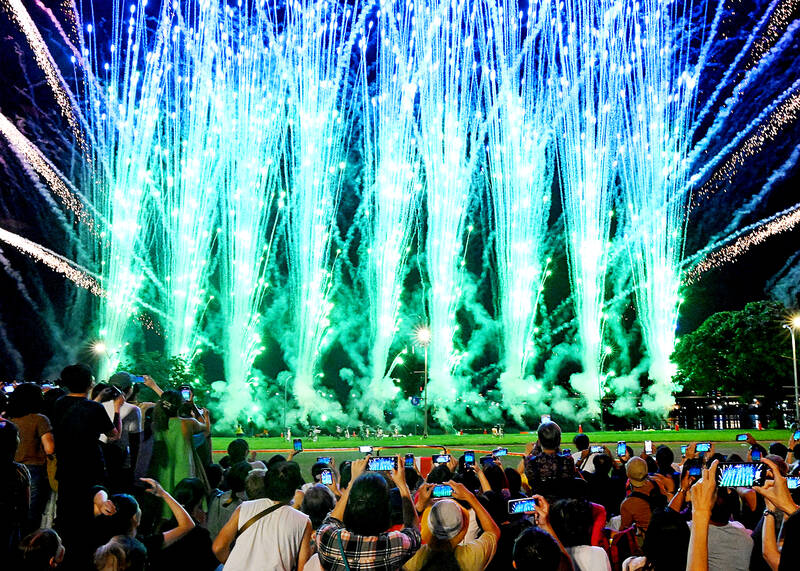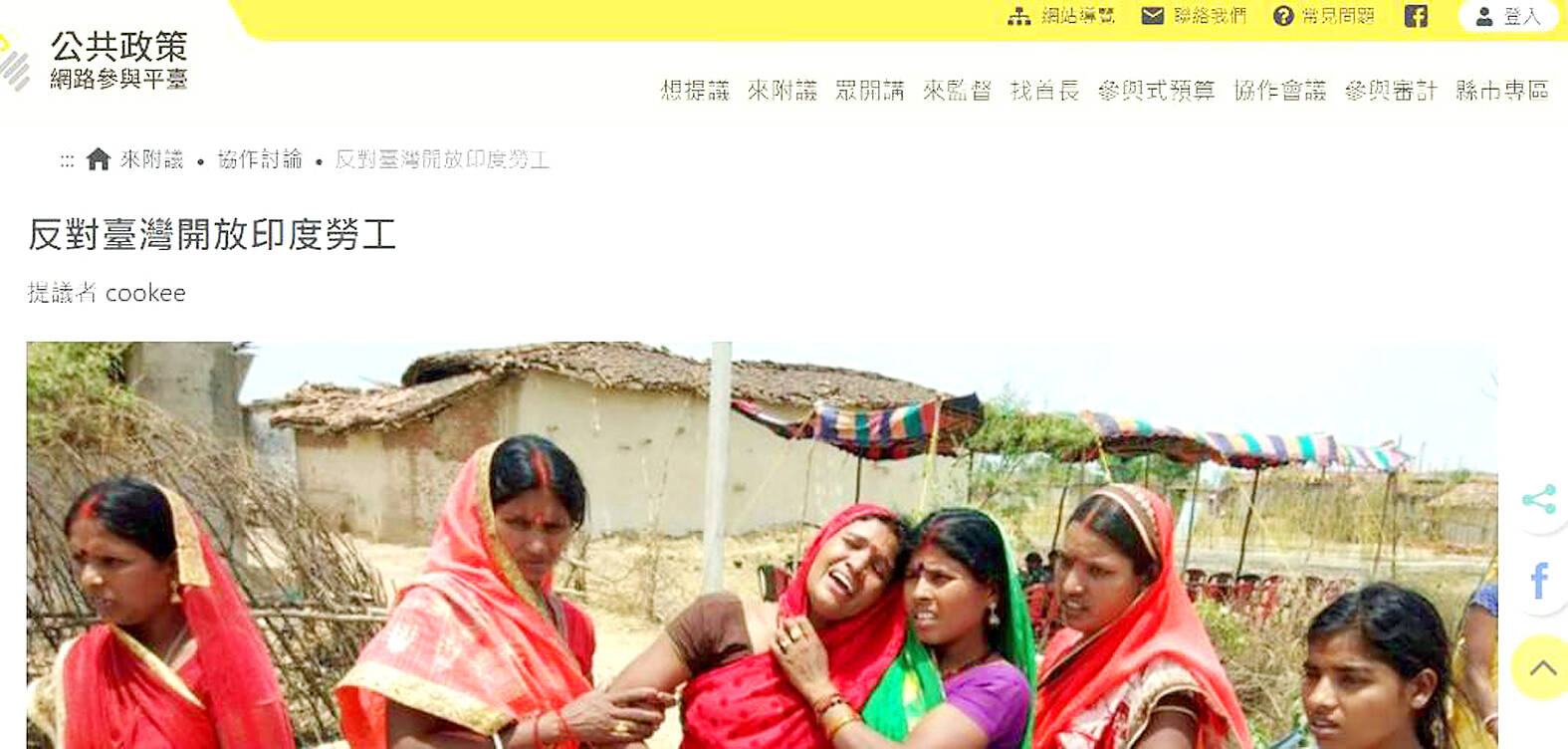Last week the news broke that Taiwan and India had agreed to sign an MOU enabling migrant workers from India to work in Taiwan, probably early next year. According to news reports, negotiations began in 2020 but were stalled by the pandemic.
The deal could call for as many as 100,000 Indian workers to eventually reside in Taiwan, but a government spokesman indicated that the actual figure would depend on the needs of industry and the skills of the worker.
Hardly had the echo of the announcement died when netizens were out in force displaying the racism that we outsiders have all come to know, with especial targeting of Indian men. Numerous screenshots of negative comments were posted to Twitter. The Chinese-language media reported not only on the vicious and abusive comments, accusing Indians of being dirty and uneducated and the men of being rapists and molesters, but that some netizens were calling for a march against them early next month. Unlikely to occur, but appalling nonetheless.

Photo: Chu Pei-hsiung, Taipei Times
IMPROVED RELATIONS
The MOU on migrant labor is a logical outgrowth of the upgrades in Taiwan’s relations with India over the last decade. In 2012 Taiwan opened a Taiwan Economic and Cultural Center (TECC) in Chennai, which was rapidly becoming a hub for Taiwanese firms. For example, in June a group of Taiwan auto industry firms held a forum in Chennai to showcase their prowess (Tamil Nadu is responsible for over a fifth of India’s auto industry production), while that same month the head of the Taiwan Chamber of Commerce was quoted in an Indian paper as saying that Taiwan’s foreign direct investment in India will undergo an eightfold increase in the next three years.
In October, the government-sponsored Taiwan External Trade Development Council held a campus recruitment campaign in Chennai, and over 100 tech professionals were recruited out of the universities there. Since 2012, roughly 60 percent of firms setting up shop in India have set up in southern India, according to government announcements. This year, plans were finalized to put a TECC in Mumbai by the end of the year, to service the growing Taiwanese business community there.

Photo: Lee Ching-hui, Taipei Times
Taiwan and India have inked a Double Taxation Avoidance Agreement (DTAA), a Customs Mutual Assistance Agreement (CMAA), the ATA Carnet Protocol, which allows duty-free temporary admission of goods without the need to raise customs bond and MOUs on several issues, including industrial collaboration. Taiwan last year sold over US$5 billion worth of goods to India. The two countries have also been talking about a free trade agreement.
Much of this growth in ties has been due to the current Administration’s Southbound Policy, which has pushed Taiwanese firms to develop alternatives to reliance on trade with the People’s Republic of China (PRC). India, which has its own troubles with China’s expansionism, has begun to see Taiwan as a useful ally and counterweight. Indeed, India’s External Affairs Minister S. Jaishankar recently discussed India’s relations with Taiwan publicly, noting the rising cooperation with Taiwan.
When I was teaching in the university system a decade ago I had several students who went to India to work in the Taiwanese factories there. I even had a student who ran a bed and breakfast in Bodh Gaya, a Buddhist pilgrimage site in northern India. But on the whole India’s contacts with ordinary Taiwanese remain limited — India is not a major tourist destination.
Sana Hashmi, the tireless fighter for better India-Taiwan links, who has written extensively on India-Taiwan issues, pointed out on Twitter that one of the problems Taiwan has in facing India is that historically India has not been a source of economic growth or funding, meaning that scholarly and media attention has largely focused on Europe and the US.
It goes without saying that Taiwan’s obsession with the perceived status of other nations means that India does not get the attention it deserves as both an economic and strategic partner.
I know a number of Indians in Taiwan, and Hashmi’s dispirited Twitter posts in response to the abusive tweets reported in the media was understandable and shared by them. But it is indicative of the insularity and provincialism that marks the way Taiwanese think about the world that none of the speakers imagined the potentially disastrous reactions of Indians at home and in Taiwan to such commentary.
INEXCUSABLE BEHAVIOR
It is obvious, as it has been in so many previous cases of racist outbursts and policies instituted by local government officials, that sustained, formal and meaningful intervention by key social and political figures is necessary. Judging from the cracks I have heard my eighth-graders repeat, the educational system needs that as well.
Someone has to explain to their parents that this behavior is inexcusable and a threat to Taiwan’s security and economy. Taiwan needs the Philippines, India, Vietnam and Indonesia as friends and allies in its struggle against the PRC. Taiwan needs their markets as well: one of the inexplicable aspects of Taiwan’s brainless xenophobia is the nation’s utter dependence on trade with the outside world. What world are these fools living in?
Someone also needs to take the immigration bureaucracy in hand and explain that its selective targeting of brown-skinned people needs to stop. As I noted in June of this year (“Discrimination tarnishes Taiwan’s image,” June 12), Taiwan’s immigration officials apparently take no note either of the island’s suicidal population policies or of its necessity to maintain good relations with people who may become persons of note in their own countries.
As I observed in that piece, a frequent response of people to encounters with the xenophobia of Taiwanese is silence. I speak from experience: after a particularly vile encounter with this garbage in my own life, I stopped writing and speaking about Taiwan for over a year.
I might be tempted to praise Taiwan People’s Party (TPP) presidential candidate Ko Wen-je (柯文哲), who last week proposed a “council of new immigrants” to handle the affairs of recent immigrants to Taiwan, along with migrant workers, foreign students and other residents from elsewhere. Laudable, but Ko that same week, in response to a question at a youth forum about his policies for LGBT individuals, responded that they suffer from a mental illness.
Given that, I suspect that in Ko’s hands the “council of new immigrants” would not be a forum for creating change in Taiwan but will instead act as a sump into which their problems can be dumped and forgotten.
Of course, at least Ko is talking about immigration and the problems of foreign residents. The other candidates?
Crickets.
Notes from Central Taiwan is a column written by long-term resident Michael Turton, who provides incisive commentary informed by three decades of living in and writing about his adoptive country. The views expressed here are his own.

That US assistance was a model for Taiwan’s spectacular development success was early recognized by policymakers and analysts. In a report to the US Congress for the fiscal year 1962, former President John F. Kennedy noted Taiwan’s “rapid economic growth,” was “producing a substantial net gain in living.” Kennedy had a stake in Taiwan’s achievements and the US’ official development assistance (ODA) in general: In September 1961, his entreaty to make the 1960s a “decade of development,” and an accompanying proposal for dedicated legislation to this end, had been formalized by congressional passage of the Foreign Assistance Act. Two

Despite the intense sunshine, we were hardly breaking a sweat as we cruised along the flat, dedicated bike lane, well protected from the heat by a canopy of trees. The electric assist on the bikes likely made a difference, too. Far removed from the bustle and noise of the Taichung traffic, we admired the serene rural scenery, making our way over rivers, alongside rice paddies and through pear orchards. Our route for the day covered two bike paths that connect in Fengyuan District (豐原) and are best done together. The Hou-Feng Bike Path (后豐鐵馬道) runs southward from Houli District (后里) while the

March 31 to April 6 On May 13, 1950, National Taiwan University Hospital otolaryngologist Su You-peng (蘇友鵬) was summoned to the director’s office. He thought someone had complained about him practicing the violin at night, but when he entered the room, he knew something was terribly wrong. He saw several burly men who appeared to be government secret agents, and three other resident doctors: internist Hsu Chiang (許強), dermatologist Hu Pao-chen (胡寶珍) and ophthalmologist Hu Hsin-lin (胡鑫麟). They were handcuffed, herded onto two jeeps and taken to the Secrecy Bureau (保密局) for questioning. Su was still in his doctor’s robes at

Mirror mirror on the wall, what’s the fairest Disney live-action remake of them all? Wait, mirror. Hold on a second. Maybe choosing from the likes of Alice in Wonderland (2010), Mulan (2020) and The Lion King (2019) isn’t such a good idea. Mirror, on second thought, what’s on Netflix? Even the most devoted fans would have to acknowledge that these have not been the most illustrious illustrations of Disney magic. At their best (Pete’s Dragon? Cinderella?) they breathe life into old classics that could use a little updating. At their worst, well, blue Will Smith. Given the rapacious rate of remakes in modern